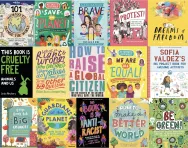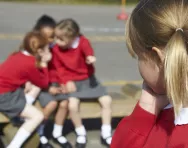Important update from TheSchoolRun
For the past 13 years, TheSchoolRun has been run by a small team of mums working from home, dedicated to providing quality educational resources to primary school parents. Unfortunately, rising supplier costs and falling revenue have made it impossible for us to continue operating, and we’ve had to make the difficult decision to close. The good news: We’ve arranged for another educational provider to take over many of our resources. These will be hosted on a new portal, where the content will be updated and expanded to support your child’s learning.
What this means for subscribers:
- Your subscription is still active, and for now, you can keep using the website as normal — just log in with your usual details to access all our articles and resources*.
- In a few months, all resources will move to the new portal. You’ll continue to have access there until your subscription ends. We’ll send you full details nearer the time.
- As a thank you for your support, we’ll also be sending you 16 primary school eBooks (worth £108.84) to download and keep.
A few changes to be aware of:
- The Learning Journey weekly email has ended, but your child’s plan will still be updated on your dashboard each Monday. Just log in to see the recommended worksheets.
- The 11+ weekly emails have now ended. We sent you all the remaining emails in the series at the end of March — please check your inbox (and spam folder) if you haven’t seen them. You can also follow the full programme here: 11+ Learning Journey.
If you have any questions, please contact us at [email protected]. Thank you for being part of our journey it’s been a privilege to support your family’s learning.
*If you need to reset your password, it will still work as usual. Please check your spam folder if the reset email doesn’t appear in your inbox.
Empathy Day 2024: Teaching children empathy

In today’s world, empathy often seems to be in short supply. Every day, the headlines are full of politicians locking horns, celebrities firing insults at each other and stories of bullying, racism and hatred.
‘Our world has never needed more empathy, kindness and compassion,’ says Avril McDonald, author of the Feel Brave series of books about big feelings.
The next generation has the power to make a big difference, and we parents can’t underestimate the importance of raising our children to be caring, empathetic beings.


Start a unique learning programme!
- Weekly programme for each school year
- Worksheets sent direct to your inbox
- Keeps your child's learning on track
What is empathy?
Empathy is the ability to understand and share someone else’s feelings.
‘I describe it as being able to put yourself in the shoes of another person and feel what they might feel in a situation – such as feeling hurt if someone has said something unkind, or feeling frustrated if they can’t master a skill,’ says Angela Cox, mindset mentor and creator of The Happy Path Journal.
Empathy isn’t the same as kindness. ‘Doing nice things for people, giving your time or showing you care fall under the banner of kindness,’ Angela explains.
Kindness is, however, often motivated by empathy. For example, if your child can see that a friend is upset because they’re being left out of a game, they’re experiencing empathy; if they then invite the friend to join their game, they’re showing kindness.
Why empathy matters
Being kind and empathetic is more than just being a ‘nice person.’ It’s vital for building relationships in childhood and into the future.
‘It’s an essential life skill that underpins a child’s ability to be a good friend, a good learner, and later, a good parent, colleague and citizen,’ agrees Miranda McKearney, founder of EmpathyLab and chair of judges for the 2019 Read for Empathy guides, which recommend books for four- to 16-year-olds to develop their empathy skills.
Being empathetic helps children develop emotional intelligence. ‘Teaching kids to consider the feelings of others will help them to understand and articulate their own feelings too, leading to improved wellbeing and mental health,’ Angela explains.
Educationally, empathy matters, too. Reading comprehension often involves children inferring how characters might be feeling, and it also plays an important part in partner and group work, PSHE lessons, debates and circle time. It even feeds into subjects like history (imagining what life was like for people in different historical periods) and drama (creating characters with believable actions and emotions).
In a tech-driven world, developing empathy helps children relate well to others online and don’t get caught up in cyber-bullying or trolling. ‘With the rise of artificial intelligence, it’s critical that children learn empathy in order to manage it for the world’s greater good,’ says Avril.
Empathy is also crucial in preventing bullying, and in building tolerance for other people and their racial background, sexuality, faith, politics and other traits that are key to their sense of identity.
When empathy doesn’t come easily
Empathy can be a tricky concept for children to master. ‘Children can be very self-centred and aren't always adept at seeing the bigger picture,’ Angela explains. ‘This is not helped by an age where narcissism is on the increase, and many of our children's role models are focused on “self.”’
Some children struggle with empathy because it has never been shown to them. ‘Children who come from traumatic backgrounds, for example, may not have had an empathetic adult alongside them, so have never seen it in action,’ Miranda says.
Excessive screentime could contribute to difficulties in developing empathy. ‘Children are communicating with each other through screens rather than face to face, and are therefore losing opportunities to practise empathy with each other,’ Avril adds.
Empathy is a skill that needs to be practised, which means that families have a vital role in helping children learn to be empathetic.
‘Parents have a huge part to play, as the amount of empathy a child has depends largely on the environment they are exposed to,’ says Angela. ‘How parents show empathy will impact how their children will.’
Schools, too, need to teach children empathy through good role-modelling. ‘They have an important role in providing empathetic adults who children can learn from,’ Miranda says.
11 ways to teach empathy
‘I believe every child has the ability to show empathy and kindness,’ says Angela. So how can we help our children become kinder, more empathetic people?
1. Build their emotional vocabulary. ‘A lot of children have limited understanding of their own emotions, which makes it very difficult for them to understand anyone else’s,’ says Miranda. Help them identify and name their emotions as they crop up: ‘I can see you’re frustrated that your LEGO model keeps breaking.’
2. Practise random acts of kindness with your child. These are demonstrations of kindness without expecting anything in return, such as helping someone tidy up in class or baking cakes to take on a playdate. ‘Carry them out then report back on what happened and how they think it made the recipient feel,’ Avril suggests.
3. Help children interpret expressions and body language. ‘Teaching them to read the faces of others and guess their emotions, or encouraging them to play-act emotions themselves, will help them connect with and detect the different feelings humans experience,’ says Angela.
4. Read all about it. ‘Books are pivotal for teaching children about empathy,’ says Miranda. ‘Reading about the characters’ feelings helps children move beyond their own experiences and towards understanding other people better.’
5. Be an empathy role model. ‘It’s so important to be present, listen carefully to your child when they have a problem and let them know that you understand how they feel,’ Angela explains. Next time your child is crying, for example, avoid the temptation to say, ‘Stop crying,’ and instead try, ‘I can see that something has upset you. Shall we talk about it?’
6. Use role-play and props. ‘If your child has failed to show empathy, try reenacting the scenario, with them playing the part of the other person, to give them an idea of their different perspective,’ says Avril. ‘You can also act it out yourself using toys, and ask your child questions about how the other person might be feeling.’
7. Explore the roots of unkindness. ‘If your child has been unkind, ask why,’ suggests Angela. ‘Speaking to your child about their behaviour, understanding why they are doing it and helping them see why it is unacceptable, before finally looking for solutions, is more powerful than shouting and sending them to bed.’
8. Embark on a group project. ‘One of the best ways to build empathy is to get children working on a task together, like a gardening project,’ says Avril. ‘This needs to be managed carefully if there’s a history of unkindness between them, but can be very effective.’
9. Look for daily examples of empathy. ‘At the dinner table, try asking your child, “What did you do today that was kind to someone?” or, “Did you see anyone doing something kind today?”’ Often, we put too much focus on what children have been learning, and neglect to ask what they’ve been doing.
10. Widen their worldview. ‘Visiting the local night shelter or food bank, or doing something for charity, can help children witness what other people experience and think through how they can become a force for good in the world,’ says Miranda.
11. Set limits on screentime. ‘It’s so important to moderate device time and give children as many opportunities as possible to socialise, play and interact with each other in order to cultivate empathy,’ says Avril.

















